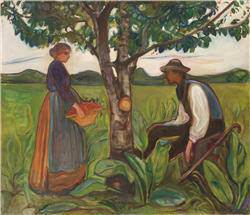
Brice Marden, Cold Mountain I (Path), Painted in 1988-89, Est. $10/15 million
Brice Marden’s ‘Cold Mountain I (Path)’ at Sotheby’s On the evening of 12 May 2010 Sotheby’s will offer the most important work by Brice Marden ever to appear atauction, Cold Mountain I (Path).]]>
April 14th 2010, source: Sotheby’s
Executed in 1988-89, the masterwork was the first in the artist’s acclaimedseries of six monumental (108 x 144 in.) canvases named for Han Shan, known as Cold Mountain, a legendary 8thor 9th century Chinese poet. The series marked the culmination of Marden’s journey toward a new style ofpainting leading away from his monochromatic, multi-panel, beeswax paintings of the 1960s and 1970s. It is theonly painting from the series of six than has ever appeared at auction and is estimated to sell for $10/15 million*when it is offered in Sotheby’s spring Evening Sale of Contemporary Art in New York.
“Cold Mountain I (Path) is likely to be the only canvas from the historic and much revered suite of six to ever besold,” noted Anthony Grant, International Senior Specialist of Contemporary Art at Sotheby’s. “Three works are inmuseum collections and two are in private collections, unlikely to be sold anytime soon, if ever.”
Few contemporary artists have reinvented their style as successfully as Marden; the Cold Mountain series marks atransformation in his work and stands as a testament to his exploratory spirit. Cold Mountain I (Path), the firstwork from the series, was painted roughly six months before the others and is at the forefront of the artist’s newdirection. It shows eight columns of elegant glyphs (the format reminiscent of the multi-panel post and panelworks that he painted in the early 1980s) that herald the direction, not only of the remainder of the series, but thepath of Marden’s oeuvre into the 1990s up to today.
Influenced by the lyrical gestures of calligraphic poetry writing, Marden reveled in a return to gestural markmaking,through numerous drawings on paper and then in his single panel vertical paintings of 1986-87.Significantly, Marden had also long admired Jackson Pollock’s genius for `drawing into painting’ which alsoexpanded from the finger and wrist to the arm and shoulder. As Marden commented in regard to the ColdMountain series, ‘One of the things I wanted to do in these Cold Mountain paintings was to lose myself in the sameway that I lose myself when I am drawing.” (Exh. Cat., New York, Dia Center for the Art, Brice Marden, ColdMountain, 1992, p. 70)
The group of six canvases was immediately prized among collectors and museum curators as a dramatic statementof painterly re-invention. Today, all are in museums or major private collections. Cold Mountain 2 (1989-91) is inthe collection of the Hirshhorn Museum and Sculpture Garden in Washington, D. C. and Cold Mountain 6(Bridge) is in the collection of the San Francisco Museum of Modern Art, while Cold Mountain 5 (Open) is part ofthe promised gift of the Meyerhoff Collection to the National Gallery of Art in Washington D.C. The group wasthe subject of a major 1991-1993 traveling exhibition in the United States and Europe organized by Dia Centerfor the Arts, which is the only time the six paintings have been exhibited together.
The present work was first acquired by the legendary dealer and collector, Thomas Ammann, followed by theDaros Collection in Zurich. It has been consigned for auction by an important American private collection.
Follow us on:


